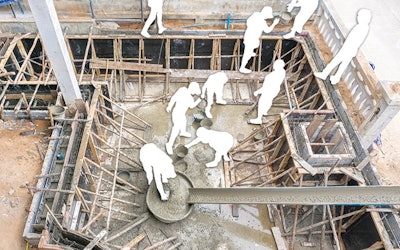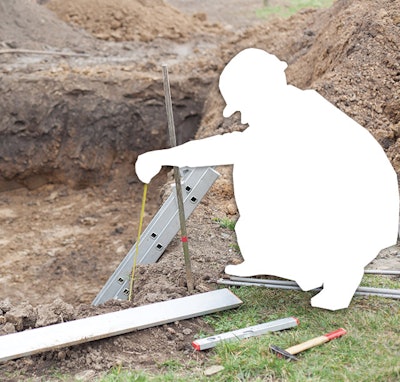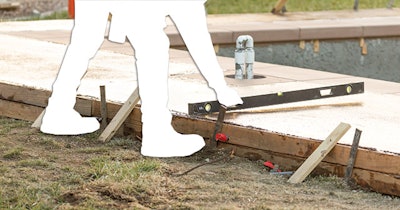
It's the bane of my existence right now," designer/builder Michael Logsdon says. Located in Bourne, Texas, the owner of Land Design is among scores of builders who point to the labor shortage as the primary challenge facing their businesses.
"I could definitely grow my business, but it's fruitless because there just are not enough people to do the work, Logsdon says. "And when I say not enough 'people' I'm not talking about skilled labor, I just mean warm bodies with a pulse and a strong back. When it comes to skilled labor, forget it! I'm making silk purses out of sows' ears and it's getting tougher all the time."
NOT ALONE
Logsdon's views are closely echoed within the pool industry and especially so from the builder segment. Last month, AQUA published the results from the magazine's 2019 State of the Industry survey. When asked about the greatest challenges facing pool builders, most responded that lack of labor, and particularly skilled labor, is by far their biggest hurdle.
"Pool builders seem to be a dying breed," one survey taker said. "There are not enough young people coming in who want to really work hard and learn how to build a pool with quality and care about their work."
"The workforce is the biggest problem," another builder replied. "We could double our business with the right people."
RELATED: Retirement Plans: A Way to Attract Great Employees
Of course this phenomenon is not limited to the pool industry — construction in general is hard pressed to find qualified workers. In fact, a recent report from the Associated General Contractors of America shows that 79% of construction companies want to hire more employees this year, but the industry is only estimated to grow its workforce by 0.5% annually for the next 10 years.
The reasons are familiar: The millennial generation in general shows little enthusiasm for construction work, population growth is slowing and the workforce is aging. But mainly, the same force that has ginned up demand for pools is making workers scarce. That force is the roaring economy.
With the economy in high gear, people want to buy more of everything (including pools), but with a limited workforce fully engaged in producing more of everything, there aren't enough workers to go around. Thus, less popular employment sectors such as ours suffer.

MATTERS OF DEGREE
The severity of the problem appears to vary from region to region and company to company. Some builders report less of an impact than others, or see the problem manifest in different ways such as longer schedules or rising costs.
"Subcontractors now are stretched thin," says Paolo Benedetti, founder of Aquatic Technologies, a design and construction firm in Morgan Hill, Calif. "Fortunately, their key employees have remained, so the work quality is still there. They are just operating fewer crews and production schedules are getting pushed out."
"What used to be a $12 to $14 dollars-per-hour labor cost, is now somewhere between $17 and $22 per hour," says Steve Swanson, owner of the Pool Company in Clayton, Calif. "Even with that, good help is almost non-existent unless I want to poach guys from my colleagues or other companies, and that's really not my style. It'll be interesting to see what happens when this hot marketplace starts to really cool off.
"Fortunately, in this economy," he adds, "I can command a little more to try and cover those increases. My guys are good and pretty well trained, but I still experience frustrations. That's just the nature of the game."
If you have weather problems added onto labor problems, as Texas designer Reid Schindler has seen in the past, a pool project can take forever. "When those two combined, it seemed like things just took ridiculously too long to complete."
RELATED: Solving Our Labor Shortage
As he starts his new company, Schindler Design Co., he says he is determined to head off subcontractors delays before they become a problem.
"I'm still trying to figure out things," he says. "I know to try and combat it on the front end and I have done things like promise next-day pay on invoices, detailed construction documents and a couple weeks heads up that the job was coming up so that I can stay at the top of subcontractors' lists. We will see how that goes for me once construction begins next month."
One of the unfortunate upshots of the shortage is, indeed, the white-hot demand it places on subcontractors, a problem that Logsdon says is reaching a critical level.
"Gunite is the worst, he says. "A quality gunite company could come into the San Antonio area, for example, and make a fortune. There are so many projects that are stalled because there's no one available to install gunite. Some of the companies that are here have become incredibly arrogant and difficult to deal with and they're price gouging. It's terrible. We have a similar issue with plaster. Some don't even call you back because they don't care. Even the companies that are trying to do a good job, they're incredibly backed up and it can be almost impossible to get them on the phone, let alone out on the job."

ONE IN 25
As a direct result of the labor crunch, finding skilled laborers has become a constant uphill battle for Kerri Allmer, office manager for the Drakeley Pool Company in Bethlehem, Conn.
"It's a challenge just getting people to come in for an interview," she says. "For example, we started trying to fill a position back in February. Unfortunately, for every five interviews we set up only three would show up. Out of the 25 people who applied, only one had any experience in the industry.
That isn't that big of a problem because we can teach them, so long as they have the right kind of work ethic. If someone has the capacity to learn and is willing to work hard, we can work with that. Unfortunately, those people are hard to find."
RELATED: Finding the Next Generation
According to Allmer, the challenge only begins when someone is hired. "You have to be prepared to invest the time and money training people that may or not be there for more than one season. We like to hire people who have worked on the farms in this area," she says. "Farmers know what hard work is all about and they have transferable experience working with irrigation systems, digging wells, building fences, etc. That's why we believe people with farm experience are among the best candidates. When it comes to construction jobs, there's not a lot of wiggle room. Either you work hard or you don't."
THE RIGHT HIRE
In this employment climate, simply finding one key quality employee can be the crux of success. "I don't know where I'd be without my man, Homar Rodriquez," Logsdon says. "He's one of those people who takes pride in absolutely everything he does and he can do almost anything on a jobsite. It's a cliché here, 'No job is too big or too small for Homar.' Guys like him are both a dying breed and I believe the hope for the future. He takes everything he does seriously and does it with pride. The only difference between him and most of these other guys is his attitude and drive for excellence, but that makes all the difference in the world. In his own humble way, he inspires me every day."












































